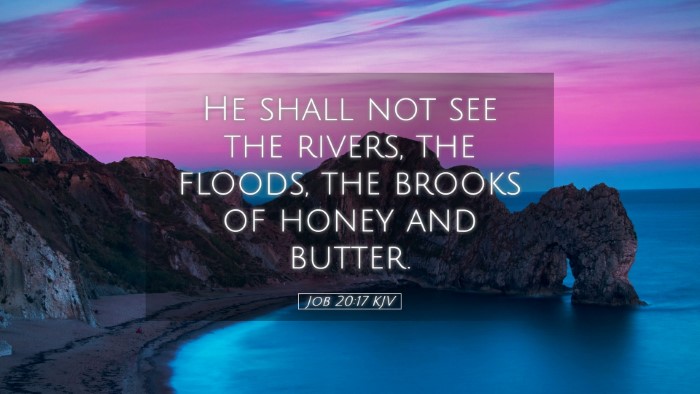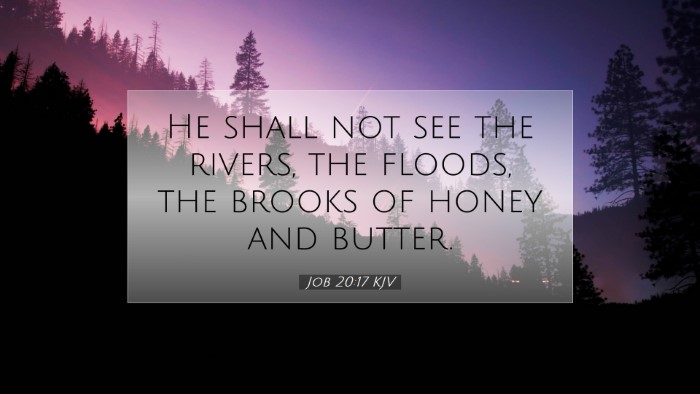Old Testament
Genesis Exodus Leviticus Numbers Deuteronomy Joshua Judges Ruth 1 Samuel 2 Samuel 1 Kings 2 Kings 1 Chronicles 2 Chronicles Ezra Nehemiah Esther Job Psalms Proverbs Ecclesiastes Song of Solomon Isaiah Jeremiah Lamentations Ezekiel Daniel Hosea Joel Amos Obadiah Jonah Micah Nahum Habakkuk Zephaniah Haggai Zechariah MalachiJob 20:17
Job 20:17 KJV
He shall not see the rivers, the floods, the brooks of honey and butter.
Job 20:17 Bible Commentary
Commentary on Job 20:17
Job 20:17 (ESV): "He will not look upon the rivers, the streams that overflow with honey and curds."
Introduction
This verse comes as part of Zophar's speech, one of Job's friends who represents a more traditional and doctrinal view of suffering and retribution. Zophar asserts the fate of the wicked, using vivid imagery to illustrate the unreachable pleasures of this life that they lose. Various commentaries provide deep insights into the implications of this verse, especially concerning divine justice and retribution.
Overview of Public Domain Commentaries
The perspectives of Matthew Henry, Albert Barnes, and Adam Clarke elucidate the theological and moral dimensions of Job 20:17.
Matthew Henry's Commentary
Matthew Henry emphasizes the consequences of a wicked life, detailing how Zophar encapsulates the fate that lies ahead for those who oppose God. He notes that the “rivers” and “streams” symbolize abundant blessings and good life experiences that the wicked will not enjoy.
- Divine Retribution: Henry states that those who live in rebellion against God may experience temporary prosperity, but ultimately, they will face divine judgment. The imagery of not looking upon the “rivers” suggests that the rewards of life will be out of reach for the wicked.
- The Loss of Joy: The streams that overflow with honey and curds indicate richness and joyfulness. The wicked lose the very focus of life’s pleasures, demonstrating that their sinful choices isolate them from God’s goodness.
- Spiritual Insight: By underscoring that the wicked do not see these blessings, Henry invokes a spiritual blindness compound by rebellion against God.
Albert Barnes' Commentary
Albert Barnes focuses on the stark realities of the consequences of sin as outlined in Zophar's words. He explicates the metaphorical references to the "rivers" and "streams," which denote not only material blessings but spiritual abundance as well.
- Symbol of Isolation: Barnes draws a clear connection between sin and alienation from God's blessings. The imagery suggests that the fruits of a prosperous life are not meant for the wicked, reinforcing the idea of their separation from divine favor.
- The Nature of Suffering: According to Barnes, the absence of "sweet streams" illustrates misunderstanding in the nature of God’s justice. The statement underscores how sin leads one to a place devoid of beauty and pleasure—consequences that extend beyond earthly existence.
- Focus on Holiness: Barnes urges readers to consider the stark contrast between the righteous and the unrighteous and the importance of living a life that is aligned with God's command. The pleasure that comes from a righteous life is eternal, unlike the fleeting joys of the unjust.
Adam Clarke's Commentary
Adam Clarke provides a detailed exegesis of the metaphors present in Job 20:17. He suggests that Zophar accentuates a theological point that is critical to the understanding of Job’s plight and the nature of divine justice.
- Exposition of Imagery: Clarke emphasizes that the rivers, streams, honey, and curds paint an image of divine abundance and prosperity that is denied to the wicked. This not only serves as a reminder of earthly pleasures but also as a stark warning against sinful living.
- Implications for Suffering: He interprets the denial of these blessings as a profound statement on the nature of God's justice where moral decay results in spiritual desolation. Clarke stresses that Zophar's verse functions as a moral compass for understanding the relationship between divine justice and human action.
- Call to Repentance: Clarke suggests that this verse serves both as a warning for the sinner and a motivation for believers to remain steadfast in righteousness as they experience the fullness of God's provisions.
Theological Insights
The insights drawn from these commentaries provide a rich theological framework for understanding Job 20:17. The role of retribution, the nature of God’s justice, and the impact of human actions on divine favor are all critical themes that emerge.
- Divine Justice: Job 20:17 encapsulates a fundamental tenet of the Judeo-Christian belief system—God’s justice. The texts remind believers that righteousness has rewards, while wickedness leads to isolation from God’s blessings.
- Spiritual Awareness: The warnings against spiritual blindness caused by sin encourage reflection and growth amongst believers. It highlights the need for continual vigilance in one’s spiritual journey.
- Moral Imperative: The necessity for righteousness is reinforced. Believers are called not only to seek personal blessings but to align themselves with divine righteousness that ensures accessibility to God’s abundant life.
Conclusion
Job 20:17 serves as a profound reminder of the significance of living a life that aligns with God’s will. The combined insights from Matthew Henry, Albert Barnes, and Adam Clarke offer a comprehensive understanding of how divine retribution and moral living are intertwined. For pastors, students, theologians, and Bible scholars, this verse is a poignant call to reflect upon the consequences of their lives and choices within the broader narrative of God’s justice and mercy.


